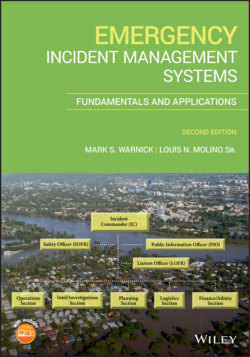Читать книгу Emergency Incident Management Systems - Mark Warnick S., Louis N. Molino Sr - Страница 10
Foreword
ОглавлениеSince the first days, when the wonderful men and women firefighters in Southern California (Firefighting Resources of Southern California [FIRECSCOPE]) decided that it was in the best interest of the community to jettison their egos and any stovepiping outside of firefighting and embraced the “Incident Management System” (IMS) and later “Incident Command System” (ICS), there has never been such a strong piece of literature on ICS. This change introduced the most effective formalization of interoperable response for collaboration, cooperation, and communication in the US national preparedness system. I am Dr. Michael A. Brown, and it is my pleasure to introduce you to the most comprehensive and thorough piece of emergency management literature ever written on the topic of the National Incident Management System (NIMS) and its component ICS. Through my career, I have read and experienced the debates from both supporters and naysayers regarding the need for and use of the ICS model. This debate is often partisan with academics sometimes noting disparaging literature about the ICS and practitioners heralding the wonderful attributes of the hierarchical operational system. I think this most comprehensive work by Dr. Mark S. Warnick will dispel any misunderstandings or doubts about what the ICS is, and is not. Further, this textbook will increase the knowledge of even the most seasoned practitioner with facts and historical relevance that left me speechless. For example, the reference to “Buffalo Soldiers” and the thorough examination of ICS around the world.
The fact that I was asked by Dr. Warnick to write the forward is noteworthy as well and somewhat ironic. When we first met, Mark was a doctoral candidate with a reputation for thorough and “out of the box” inclinations that sometimes rattled his peers, but his foresight always proved invaluable with hints of Edgar Cayce futuristic predictability. Little did we know that he and I had served together in the unit in the military, and the same barracks some 40 years prior, and of course “fast FORWARD,” (play on words) we continue to serve. I ask you to read this masterful emergency management literature and marvel at the precision, depth of research and evaluative beauty within each chapter. Learn about Australia, Canada, and even the Maldives' ICS. The information provided on social media is cathartic, and his insight on ICS for houses of worship a must read. Understand that the proliferation, intensity, and size of focusing events will continue, which means the need for ICS and its closely tethered interoperability is needed more than ever. Is ICS a panacea for disasters? No! But it is a most effectual operational tool for coping with and helping to respond to all manner of hazards. In closing, I wish to thank Dr. Mark S. Warnick for providing the disaster preparedness and emergency management community with a jewel of literature that will change the courseroom and emergency operations centers for the better in the future.
Michael A. Brown Core Faculty Emergency Management Capella University School of Public Service
